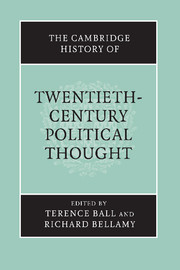Book contents
- Frontmatter
- Editors’ introduction
- Part I The changing fortunes of liberal democracy
- 1 The coming of the welfare state
- 2 Politics and markets: Keynes and his critics
- 3 The advent of the masses and the making of the modern theory of democracy
- 4 Nationalism and imperialism
- 5 Fascism and racism
- 6 Conservatism
- 7 Christian democracy
- 8 Critics of totalitarianism
- 9 The end of the welfare state?
- Part II Varieties of Marxism
- Part III Science, modernism and politics
- Part IV New social movements and the politics of difference
- Part V Beyond Western political thought
- Biographies
- Bibliography
- Subject index
- Name index
- References
8 - Critics of totalitarianism
from Part I - The changing fortunes of liberal democracy
Published online by Cambridge University Press: 28 March 2008
- Frontmatter
- Editors’ introduction
- Part I The changing fortunes of liberal democracy
- 1 The coming of the welfare state
- 2 Politics and markets: Keynes and his critics
- 3 The advent of the masses and the making of the modern theory of democracy
- 4 Nationalism and imperialism
- 5 Fascism and racism
- 6 Conservatism
- 7 Christian democracy
- 8 Critics of totalitarianism
- 9 The end of the welfare state?
- Part II Varieties of Marxism
- Part III Science, modernism and politics
- Part IV New social movements and the politics of difference
- Part V Beyond Western political thought
- Biographies
- Bibliography
- Subject index
- Name index
- References
Summary
Introduction
It is common among intellectual historians to conceive of distinct historical periods in terms of the values or world views to which these periods seem to give expression. Thus the eighteenth century is sometimes called the Age of Reason or Enlightenment, and the nineteenth the Age of Ideology or the Age of History. Raymond Aron, in a book of the same name, dubbed the twentieth century the Century of Total War (Aron 1955). Like all historical generalisations, this one seeks to capture what is fundamental – in this case, the organisation of prodigious violence and destructiveness – at the expense of developments deemed less than fundamental, however important they may be. Of course this involves certain judgements of significance. Aron was far from being alone in his assessment of what distinguishes the twentieth century.
The twentieth century has seen the perfection of revolutionary new technologies – petrochemicals, electronics, nuclear power, a ‘world wide web’ of computer networks. It has seen the emancipation of women in many parts of the world; the rise and fall of empires, the organisation of national independence movements and wars of ‘national liberation’; the rise and fall of communism in Russia and Eastern Europe; the establishment of the United Nations; the creation of the modern welfare state; and the emergence of a ‘third wave’ of liberal democratic transformation in Asia, Africa and Latin America. In the face of all of these developments, many of them undoubtedly beneficial, all of them consequential, why think of the century as a century of total war?
- Type
- Chapter
- Information
- The Cambridge History of Twentieth-Century Political Thought , pp. 181 - 201Publisher: Cambridge University PressPrint publication year: 2003
References
- 12
- Cited by

